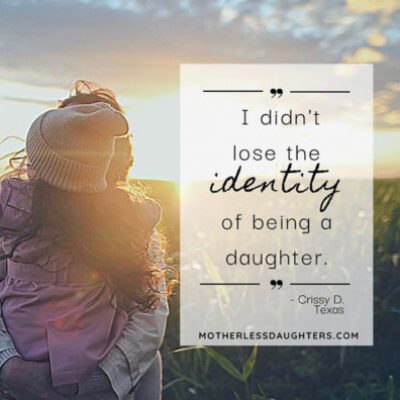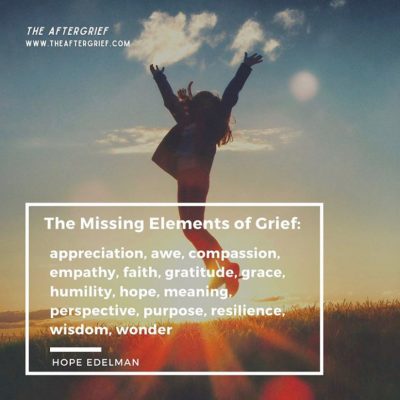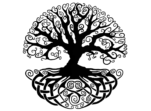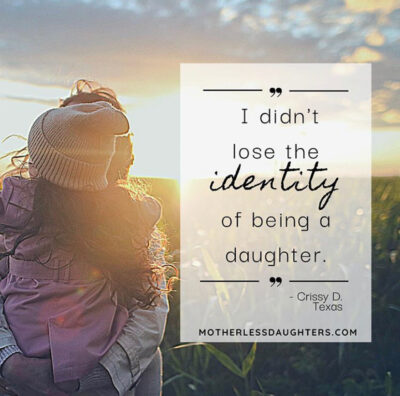Healing the Before-and-After Rift
When she recently spoke with Rebecca Soffer about her upcoming book, The AfterGrief, Hope Edelman discussed the need to bridge the “before and after” narrative. She pointed out that that rift in our lives also becomes a rift in our identity. She understood its importance, she says, when she saw this touching conversation between Anderson Cooper and Stephen Colbert, which aired in August 2019.
While their entire talk speaks so clearly to the impact of grief on the lives of those who experience it, especially when they are young, pay particular attention to what Anderson shares, beginning at 1:15:
"For me, losing my dad (at 10)...changed the trajectory of my life. I'm a different person than I feel like I was meant to be... To this day, I mark time between while my dad was alive and after. It's like the new year zero."
-Anderson Cooper
This has the ring of truth to me. As I write in The Full Catastrophe, speaking of the years that followed my mother’s death when I was 12, only 10 months after my father had died:
“…life as I knew it was only a memory now. I didn’t know how to absorb what had happened to me, how to accept that that was ‘before,’ that everything from here on in would be my ‘after.’ My childhood, the whole of it, increasingly seemed like a dark fairy tale, a story that had happened to someone else.”
For decades after that, I pictured my life as a timeline, a fat, black magic marker slash dividing it inalterably between the years when my parents were alive, when the four of us lived as a family, and all the years that would follow.
Stephen Colbert chimes in (1:56): “There’s that kid before my father and my brothers died… There’s this big break in the cable of my memory at their death. Everything before that has got an odd, ghostly quality…flashes…like the music from that summer leading up to it will undo me in an instant.”
In my 20s and 30s, I rarely allowed myself to connect with the fact that in another story I might have grown up with a doting dad, a loving mom, and who might I be then? I couldn’t begin to imagine having parents and a brother in my life, couldn’t connect with the fact that I looked like someone. It was more than I could bear, so I avoided it altogether.
Yet when I watched sad movies late at night as my husband and kids slept, I’d find myself sobbing for everyone I’d lost.
Over time, I developed ways of conceptualizing my early life that helped me put words to the things I was feeling, things no one else I knew could understand.
My mother had loved JFK, and she had always reminded me of Jackie. When he died, I knew it was the end of something special–Camelot, they called it. I began to think of those years when my parents were alive as our own Camelot, my dad and mom the hero and heroine of their own tragic tale.
At other times I pictured the claw in the stuffed animal machine outside our grocery store snatching me up from my New Jersey life and plunking me down in Upstate New York–catch, transfer, release–with nothing more than my clothes, my dresser, and my mother’s sewing machine.
Most often, though, it felt like the ’66 Bonneville that transported me to my new home had dropped me into Oz instead. Blink and you live in a strange place. Nothing is familiar. Forget you had a family. That’s over now.
Anderson said precisely what I'd felt back then:
“I’m a different person than I feel like I was meant to be.”
Early on, just into my teens, I set that life aside and moved forward, or so I thought. I couldn’t allow myself to connect with the person I’d been before, and I lived at a time and in a home where there were minimal opportunities to talk about my parents or–horrors–my feelings.
Yet healing can happen at any point–ten, thirty, even fifty years later.
For me, it took both time and becoming a mother to begin to reconnect with all of the ways my mother’s love had shaped me. I recognized in my interactions with my own children the same warmth and care she had given me. When I hugged them and rubbed their backs, I could feel her doing the same for my 10-year-old self, even as she grew weak with cancer.
I saw my father’s charisma and wit and Irish charm in my oldest son, Eric, and connected with a daddy who had shown his love through good-natured teasing. I remembered what it was like to have had a big brother as Eric became a big brother to our younger son and daughter. When one day I realized the age difference between Eric and his sister was nearly exactly the spread that had existed between my brother and me, I was remarkably unsurprised. It all made perfect sense.

This before-and-after divide is yet another example of the lifetime impact of early loss. Still, rather than adding the loss of our own identities–as children, as siblings, even later as parents of a child who has died–to the pile of losses to “get over,” how much kinder it is to allow ourselves to accept and even embrace these roles, long after our loved ones have passed.
It took decades for me to fully reinhabit the role of my parents’ daughter and my big brother’s little sister. Because of that experience and many others, I understood when my son died that though I grieved the loss of having him here with me in body, there would never be even a moment’s pause in my ability and desire to embrace my identity as his mother.
Hope reassures us that, though grief is a lifelong process, it doesn’t have to be a lifelong struggle.
What wonderful news.
As we change the stories we tell ourselves about loss, we can experience post-traumatic growth, and find meaning and purpose in helping others navigate the long arc of grief.



Interesting interview. Anderson Cooper describing himself as a “catastrophic” (if I have that correct) reminds me so much of your story, Casey. And I love that quote: though grief is a lifelong process, it doesn’t have to be a lifelong struggle.” It’s what your message is all about, and it will resonate with so many (including Colbert and Cooper, I’m sure!)
Pingback: Exploring The AfterGrief, Part Three: Learning To See It Differently - Casey Mulligan Walsh